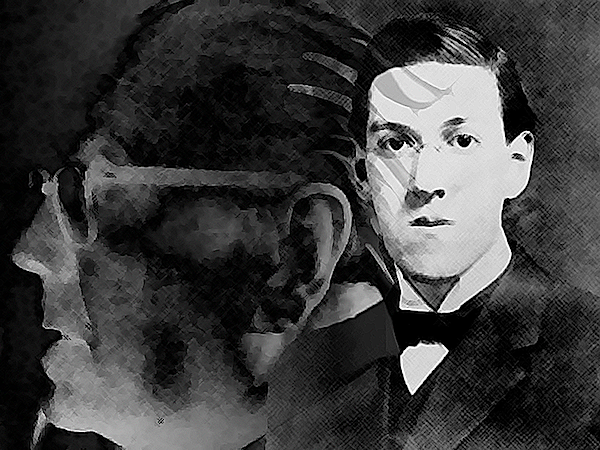
In many ways, Howard Philips Lovecraft and Jorge Luis Borges are different.
Howard Philips Lovecraft wrote dark, atmospheric American horror at the dawn of the twentieth century. Jorge Luis Borges, born ten years later, wrote learned, ethnic Argentinian magic realism.
Lovecraft toiled in obscurity, writing for pulps; Borges was crowned with every prize the literary world has to offer short of the Nobel. Lovecraft was a high school dropout; Borges was a renowned professor of literature.
But in many ways, Howard Philips Lovecraft and Jorge Luis Borges are similar.
There’s the obvious: both the dropout and the professor were masters of erudition, capable of bring a vast number of literary techniques to their stories. Both focused largely on stories that were deeply regional, steeped in the lore of the cultures that they loved. And both were obsessed with odd details: for Borges, the labyrinth, the knife, and the tango; for Lovecraft, tangled streets, dark forests, and fishy odors.
But the important similarities between Lovecraft and Borges run far deeper.
Borges plays games with the infinite, constructing labyrinths of time and symbols that dig at the foundations of our concepts of thought and identity. His most famous story, “The Library of Babel,” imagines an infinite library filled with useless books, whose meaning might only be discerned by the allseeing eye of a god—a story that plays with ideas of faith in a random universe.
Lovecraft plays games with the cosmos, constructing vistas of time and space that threaten the foundations of our concepts of safety and knowledge. His most famous story, “The Call of Cthulhu,” imagines an undersea city inhabited by an enormous monster, whose existence threatens the sanity of humanity—a story that plays with ideas of fear and cosmic insignificance.
Borges and Lovecraft are similar, but not identical.
In Borges, the supernatural rarely breaks into the natural world openly, and when it does, it happens in dreams and visions or subtle events. The supernatural is subtle, but the meaning is not: Borges often tells us his aim directly in his stories, frequently writing them like essays that explore their own morals, or examining their meaning in conversations with himself. Borges plumbs the depths of human thought through stories that show us the vast scale of conceptual space. Throughout his work is a taste of nihilism: humans seeking meaning in a meaningless cosmos.
In Lovecraft, the supernatural manifests in dreams and vision and subtle events, but it always breaks into to the natural world openly. The supernatural is not subtle, but the meaning is: Lovecraft rarely tells us his aim directly in his stories, instead writing essays that explain their morals, or examining their meaning in letters to friends. He explores the cosmic through metaphor. Lovecraft plumbs the depths of human insignificance through stories that show us the vast scale of physical space. Throughout his work is a taste of nihilism: humans seeking sanity in an inhuman cosmos.
Lovecraft and Borges are two sides of the same coin.
They write about the same terrors. In Borges, the monsters swim beneath the surface, their shapes only dimly suggested by the churning existential confusion left in their wakes. In Lovecraft, the monsters break the surface, turn their dripping, shaggy visages towards the horrified faces of his protagonists, and show us that if we could truly see what Borges only hints at, we would surely go mad.
-the Centaur
Credits: public domain images of Lovecraft and Borges both from Wikimedia Commons; composition by me.
